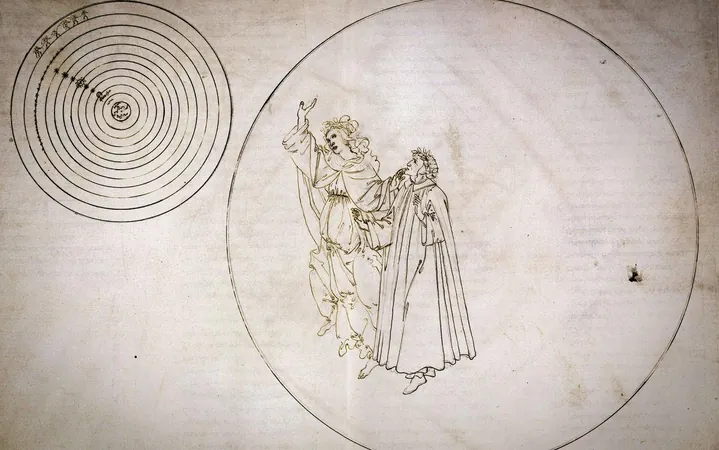
The Hidden Beauty of the Philosophy of Physics: Why It Matters More Than You Think
2025-06-06
Author: Ting
Imagine dropping the term "philosopher of physics" at a party. You’ll likely get a mixed bag of reactions—curiosity, confusion, or even dismissal. "What does philosophy have to do with physics?" or "Shouldn’t you be doing engineering?" are common retorts. Yet, understanding the philosophy of physics isn’t just an academic exercise; it’s essential for grasping the profound implications of the theories that govern our universe.
What Exactly is Philosophy of Physics?
At its core, the philosophy of physics goes beyond mere theories; it dives into a systematic investigation of our most robust scientific frameworks. It encompasses everything from Newtonian mechanics to quantum mechanics and the latest advances in cosmology. Philosophers of physics ask critical questions like, "What if this theory is true?" or "What does it reveal about time, causality, and identity?" This inquiry isn't just abstract—it's crucial for understanding how theories shape our worldview.
A Dance Between Two Disciplines
The boundary between physics and its philosophical critique is exceptionally thin. Both fields often overlap in their quest to unravel the mysteries of the universe. While physicists churn out testable theories, philosophers dissect their assumptions and implications. This dynamic interplay has deep historical roots, stretching back to the legacies of Aristotle and Newton.
From Ancient Giants to Modern Marvels
Aristotle laid the groundwork for scientific questioning, while Newton’s revolutionary insights continued to inspire not just scientists but thinkers, probing philosophical questions about space and time. In their correspondence, Leibniz and Clarke extended this discourse, tackling topics like absolute versus relative motion—conversations that would not have emerged without Newton's theories.
The Historical Tension: Divorce or Collaboration?
After the Enlightenment, many argue philosophy and physics started drifting apart, diverging like two roads in the woods. However, even during the so-called ‘amicable divorce’, philosophical inquiry stubbornly persisted in the shadows, influencing major breakthroughs even in the 19th century.
The 20th Century: A Shift in Attitudes
Fast-forwarding to the 20th century, a rift developed as some physicists dismissed philosophy as irrelevant. This attitude peaked, notably with Stephen Hawking deeming philosophy 'dead'. What spurred this hostility? Influential figures like Niels Bohr proposed that fundamental realities might be ineffable, leading to skepticism about physics itself.
A Revival on the Horizon?
Yet, there’s a renaissance unfolding! With the complexities surrounding the Standard Model and modern quantum theories, physicists are once again engaging with philosophical thought. Issues like 'decoherence' in quantum mechanics have sparked renewed interest and dialogue between physicists and philosophers.
A Bright Future for Philosophy of Physics
Today, nearly 300 philosophers specializing in physics are making significant contributions, engaging actively with modern scientific challenges. Institutions like the Radboud Centre for Natural Philosophy are emerging, reflecting a budding interest in combining these disciplines.
An Artistic Pursuit of Understanding
Ultimately, the philosophy of physics holds a vital role. It’s not just about dry, academic musings but a rich landscape teeming with beauty, insight, and creativity. The elegance of gauge theory in particle physics is comparable to the finest masterpieces in art. Philosophers of physics offer a unique perspective, liberating us to explore and critique our most profound theories without getting bogged down in experimentation.
So next time someone questions the value of philosophy in physics, remember: This discipline isn’t just a niche hobby; it’s a crucial canvas where the boundaries of science, philosophy, and art elegantly intertwine.



 Brasil (PT)
Brasil (PT)
 Canada (EN)
Canada (EN)
 Chile (ES)
Chile (ES)
 Česko (CS)
Česko (CS)
 대한민국 (KO)
대한민국 (KO)
 España (ES)
España (ES)
 France (FR)
France (FR)
 Hong Kong (EN)
Hong Kong (EN)
 Italia (IT)
Italia (IT)
 日本 (JA)
日本 (JA)
 Magyarország (HU)
Magyarország (HU)
 Norge (NO)
Norge (NO)
 Polska (PL)
Polska (PL)
 Schweiz (DE)
Schweiz (DE)
 Singapore (EN)
Singapore (EN)
 Sverige (SV)
Sverige (SV)
 Suomi (FI)
Suomi (FI)
 Türkiye (TR)
Türkiye (TR)
 الإمارات العربية المتحدة (AR)
الإمارات العربية المتحدة (AR)